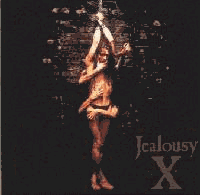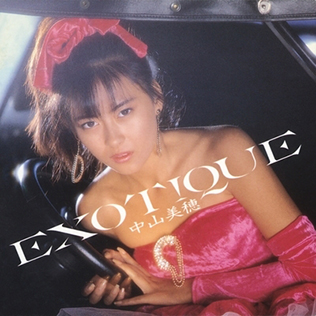J-pop, natively also known simply as pops, is the name for a form of popular music that entered the musical mainstream of Japan in the 1990s. Modern J-pop has its roots in traditional music of Japan, and significantly in 1960s pop and rock music. J-pop replaced kayōkyoku in the Japanese music scene.
Toshinobu "Toshi" Kubota is a Japanese singer, songwriter, musician, music producer, and radio personality. He has produced six million-seller records and thirty-three Top 40 singles during his career. Kubota is currently part of Sony Music Japan. In addition, he has composed and written songs for many singers including Hiromi Iwasaki, Misia, Toshinori Yonekura, Kyōko Koizumi, and many other recording artists.

Chihiro Onitsuka is a Japanese singer-songwriter.
Noriko Kamachi, known professionally as Seiko Matsuda, is a Japanese singer-songwriter, known for being one of the most popular Japanese idols of the 1980s. Since then, she is still actively releasing new singles and albums, doing annual summer concert tours, winter dinner shows, high-profile TV commercials and movies, and makes frequent TV appearances and radio broadcasts.

Concentration 20 is the third studio album by Japanese singer Namie Amuro, released July 24, 1997, by Avex Trax. The album's genre is a fusion of styles including pop, dance and rock. Unlike Amuro's previous effort, Sweet 19 Blues, which primarily had lyrics written by Tetsuya Komuro, Concentration 20's lyrics were mostly written by Marc Panther. Komuro did, however, compose and arrange most of the album's songs and wrote the lyrics to three of them, it was Namie's second solo album since the beginning in 1997.

Merveilles is the third studio album by Japanese rock band Malice Mizer, released on March 18, 1998 by Nippon Columbia. It is the band's only album on a major record label and their commercially and critically most successful album.

Jealousy is the third studio album by Japanese heavy metal band X Japan, then known as simply X. The album was released on July 1, 1991, by Sony, as the band's second major label release. Jealousy is the band's best-selling album, having sold more than one million copies, it topped the Oricon chart and stayed on the chart for 50 weeks. The album's singles would also reach the top three on the chart. It is their last album under the name "X", before changing to "X Japan", and the last to feature Taiji on bass, who would be replaced by Heath.

All the Best! 1999–2009 is the third greatest hits album by Japanese pop boy band Arashi. The album was released on August 19, 2009, in Japan under their record label J Storm in two editions, a limited 3CD version and a regular 2CD version. The album debuted at number-one on the Oricon album weekly chart, selling 753,430 copies. Thirteen days after the release of All the Best! 1999–2009 the album sold over a million copies. As of September 22, 2009, All the Best! 1999–2009 had overtaken Supermarket Fantasy to claim the title of best-selling album of the year in Japan. On December 18, 2009, Oricon officially ranked All the Best! 1999–2009 as the best-selling album in Japan for 2009, with over 1.43 million copies sold.

La La La Love Thang is the ninth studio album of Japanese singer Toshinobu Kubota, released on December 2, 1996. The album has been certified triple platinum by the Recording Industry Association of Japan. It was also successful in international music markets and yielded two singles: "Niji No Grand Slam" and "La La La Love Song". Kubota then embarked on his first international concert tour in 1996, which he titled the Oyeees! Tour. A live album, Toshinobu Kubota Concert Tour '96: Oyeees!, was released which featured footage from the tour. As of February 2012, La La La Love Thang has sold over 840,000 copies worldwide.

"Feel Like Dance" is the debut single by Japanese band Globe. Written by Tetsuya Komuro, the single was released on August 9, 1995, by Avex Globe.
The discography of Japanese R&B singer Toshinobu Kubota consists of nineteen studio albums, ten compilation albums, two tribute albums, and over seventy singles. In 1985, Kubota signed with Sony Japan and began producing and writing songs for many of label's singers and groups. Under the label, Kubota released his first single, "Shitsui no Downtown" in June 1986, followed by "Time Shower ni Utarete" in December. Both songs were well received by radio, placing fifty-three and thirty-five on the Oricon Singles Chart. In September 1986, his debut album, Shake It Paradise, peaked at number twenty-two and remained on the Oricon Albums Chart for seven consecutive weeks. Shake It Paradise became certified million. The following year in 1987, Kubota's second studio album, Groovin', debuted at number thirty-three and was certified million. In February 1988, Kubota released "You Were Mine", which debuted at number two. In September 1988, Kubota released his third album, Such A Funky Thang!. The album peaked at number one and was certified million. The album also spawned the top-charted single "Dance If You Want It", which peaked at number three. In 1989, Kubota released his compilation album, The Baddest. The album also peaked at number one and was certified million.

Wake Up is the first Japanese and second overall studio album by South Korean boy band BTS. It was released in Japan on December 24, 2014, through Pony Canyon. The 13-track album includes Japanese versions of the band's Korean singles "No More Dream", "Boy in Luv", and "Danger"—all of which were released in the months prior as physical Japanese singles—and two new, original Japanese songs: "The Stars" and "Wake Up". The album became BTS' highest-charting and best-selling album in Japan at the time, following its debut at number three on the Oricon Albums Chart, and sales of over 28,000 copies.

Sandaime J Soul Brothers, formerly simply J Soul Brothers and also known as Sandaime J Soul Brothers from Exile Tribe, are a J-pop vocal and dance group formed by Exile ex-leader and producer Hiroyuki Igarashi in Japan in 1991. Sandaime J Soul Brothers are managed by Hiroyuki's talent agency LDH and are a part of the supergroup, Exile Tribe. Reformed exclusively by Exile's Vocal Battle Audition in 2010, Sandaime J Soul Brothers released their first single "Best Friend's Girl" in November 2010, which peaked at number three on the Oricon Singles Chart. Their self-titled debut album J Soul Brothers, released in 2011, also peaked at number three. In 2013, they achieved their first number-one record with their third album Miracle.

"Departures" is the fourth single by Japanese band Globe. Written by Tetsuya Komuro, the single was released on January 1, 1996, by Avex Globe.

5x20 All the Best!! 1999–2019 is the fifth greatest hits album by Japanese boy band Arashi. It was released through J Storm on June 26, 2019. The album debuted at the top spot of the Oricon Weekly Albums chart, selling 1,304,251 copies in its first week of release in Japan. It spent the most weeks at number one of any album on the Oricon Albums Chart in 2019, with four, and was both the best-selling album of 2019 in Japan, as well as worldwide, with 3.3 million copies sold, eventually becoming the world's best-selling album of the year for 2019.
Best Hits Album is the title of two different greatest hits albums by Japanese idol duo Pink Lady, released through Victor Entertainment in 1977 and 1978.

BTS, the Best is the second Japanese-language compilation album by South Korean boy band BTS. It was released on June 16, 2021, through Big Hit Music, Universal Music Japan sublabel Virgin Music and Def Jam Recordings. The album is a compilation of their previous two Japanese-language studio albums, Face Yourself (2018) and Map of the Soul: 7 – The Journey (2020). It was a commercial success in Japan, reaching number one on the Oricon Albums Chart, and earned the biggest first week sales for an album in 2021 domestically. BTS became the first South Korean group to surpass the 1 million sales mark for an album in the country.

Exotique is the fourth studio album by Japanese entertainer Miho Nakayama. Released through King Records on December 18, 1986, the album features the single "Waku Waku Sasete". It is a concept album themed around exotic world travel. The songs in Exotique were solely written by Takashi Matsumoto and Kyōhei Tsutsumi and arranged by Motoki Funayama.

Collection III is the seventh compilation album by Japanese entertainer Miho Nakayama. Released through King Records on Nakayama's birthday of March 1, 1995, the album compiles her singles from 1991 to 1994, including her Japanese-language cover of Mariah Carey's "Hero". The popularity of the million-selling songs "Sekaijū no Dare Yori Kitto" and "Tada Nakitaku Naru no" helped boost the album's sales.

The albums discography of American singer-songwriter Janet Jackson consists of eleven studio albums, four compilation albums, and two remix albums. When she was sixteen, her father arranged a contract for her with A&M Records. Her debut album, Janet Jackson (1982), peaked at number 64 on the US Billboard 200 chart and sold 250,000 copies in the US. Her next album, Dream Street (1984), peaked at number 147 on the Billboard 200, a weaker effort than her previous album. Her third album, Control (1986), which became known as her breakthrough album, topped the Billboard 200 and sold over 10 million copies worldwide. Her fourth album, Janet Jackson's Rhythm Nation 1814 (1989), topped the Billboard 200 for four consecutive weeks and sold three million copies within the first four months of its release. The album went on to produce seven consecutive top 5 hits, four of them reaching the top spot on the Billboard Hot 100 in three separate calendar years, a record yet to be broken. The album was certified 6× Platinum by RIAA, and sold over 12 million copies worldwide.














